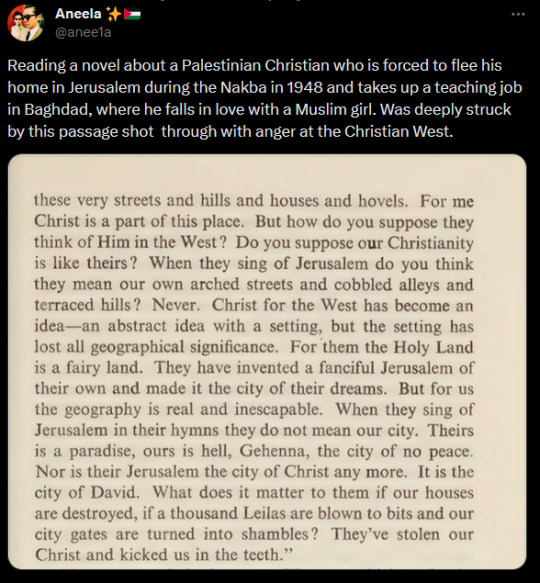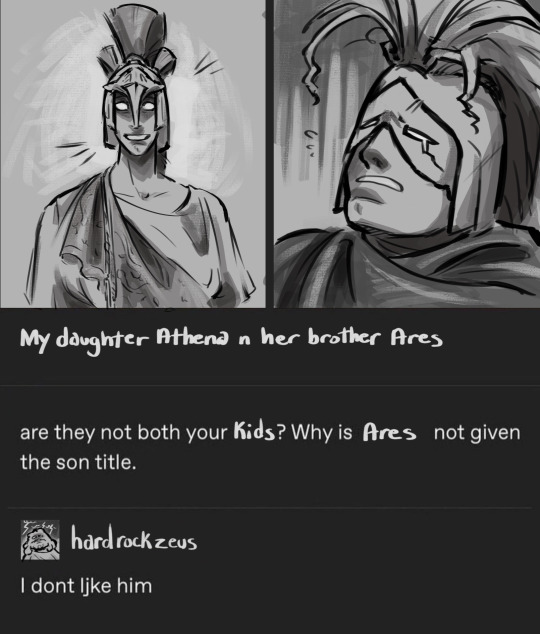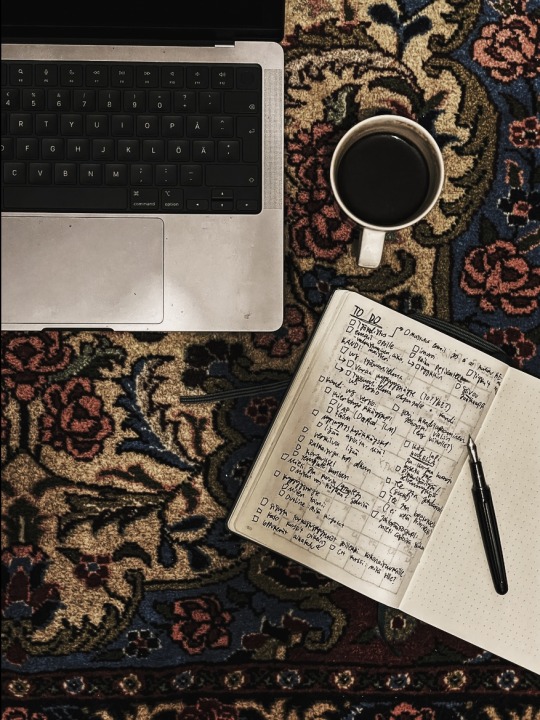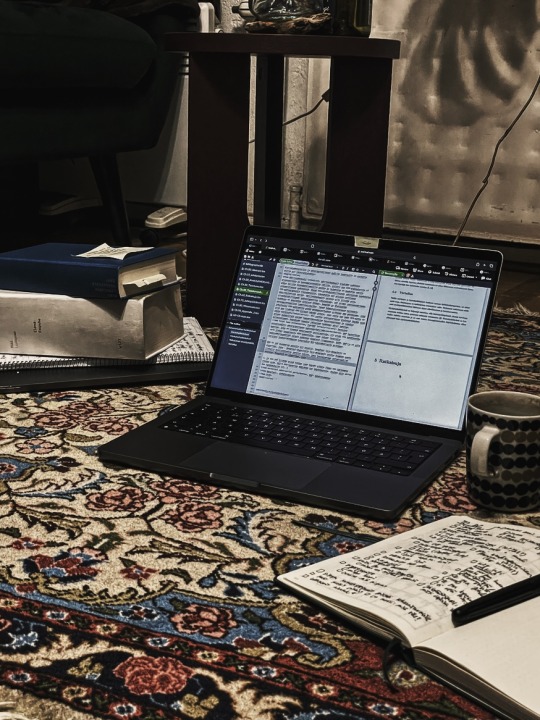#on my reading list
Explore tagged Tumblr posts
Text

87 notes
·
View notes
Text

An extract of Female Perversions: The Temptations of Emma Bovary by Louise J. Kaplan, in the film Female Perversions (1997) dir. Susan Streitfeld
[transcript] - "For a woman to explore and express the fullness of her sexuality, her emotional and intellectual capacities, would entail who knows what risks and who knows what truly revolutionary alienation of the social conditions that demean and constrain her. Or she may go trying to fit herself in the order of the world and thereby consign herself to the bondage of some stereotype of normal femininity — a perversion, if you will."
7 notes
·
View notes
Text
Selfish reblog
omg it’s FAN FICTION FRIDAY
Reblog and promote a fic of yours <3
9K notes
·
View notes
Text

thinking about this today
#OP said the book is hunters in a narrow street#by jabra ibrahim jabra#going on my to read list#palestine
21K notes
·
View notes
Text
I read too many stories of "women" throughout history who lived as men and wore men's clothing getting beaten and arrested for it, sensationalized in the press as "man-woman," painted as perverts and monsters, put in literal freakshows, and forcibly institutionalized to sit by quietly while non-transmascs loudly and confidently claim that "female masculinity" has never been targeted as much as "male femininity" has. Read some trans and queer history that isn't only about gay men and trans women before you open your mouths about butches and transmascs, or better yet just listen to us about our history and experiences in the first place.
#not to mention the modern day lived experiences of trans men and mascs we are always trying to tell you about#I get laughed at and called a dyke for the way I present but yeah sure non transmasc tumblr user you definitely know my life better than me#I've compiled a reading/re-reading list for myself using material from my trans studies classes & over the next couple weeks#I'll be posting some important bits from them that illustrate some of these situations I've learned about once I have more details#trying not to engage with transandrophobes online but when this rhetoric is coming directly from trans academics it's like :/#transandrophobia#mine
3K notes
·
View notes
Text
Ghost erotica
The epic of gilgamesh
Bdsm erotica
Third vampire book in a series
0 notes
Text
what's a book you read as a teenager that was so magical and personally profound to you it literally changed your life, doesnt matter if the book was actually well written or not. mine's probably the catcher in the rye
45K notes
·
View notes
Text
They don’t even attempt to assassinate US politicians anymore. You notice that? Not since the anthrax scare back for… who was it, Barack? And even that… pathetic. This new generation has no respect for an honest hitman. I’m not sure this new generation has any honest hitman - you see that shit with Boeing? Sloppy, fucking disgraceful - you kill the whistleblowers before they get halfway to a lawsuit. What kind of fucking amateur is doing faked suicides the night before testimony? Goddamn greenhorns. Back in my day someone tried to shoot Ronald Reagan in broad daylight. There used to be bomb threats to Congress. I took out a few union leaders in the utilities sector myself. Today’s generation? Won’t even threaten to throw a punch - not even over on that - what’s it now, ‘X’? They got no guts. None! And they don’t even have poor impulse control to boot! Too much of that - that panopticon anxiety bullshit. “Oh what if I get a called out post???” People used to send the president letters full of bioweapons. In the mail! Today’s generation? Not a chance. All because of woke.
#ra speaks#personal#JOKING.#this is a joke this is a parody of right wing rants regarding social phenomenon they believe to be oppressed by left leaning politics.#but within the perspective of an old fictional hitman.#this is a joke tangentially referencing my fictional hitmen from a fictional story in which no harm comes to career politicians#obviously but also if this gets me on a list o7#fbi agent in my phone I’m a disabled autistic dyke with zero engineering or chemistry background#my skills are best applied to…idk sabatoging national forest harvest regimes? but I’m not doing that they’re neglected enough as is.#edit: oops this is getting notes o/ hiiiii cia agent reading this post <3 a union leader my dad worked w got fucking assassinated#by Pinkertons and y’all didn’t do shit. I hope you have visions of hell and become a nomadic hermit self flagellating in the woods#edit 2: ooooooh there was a pres debate last night. that’s why people care about my two week old joke hitman post. was wondering why.
3K notes
·
View notes
Text

reading the Iliad is an experience
#help how do i tag this#greek mythology#athena#ares#zeus#the iliad#genuinely this is untaggable#fan art#artists on tumblr#digital art#sketch#doodle#my art#the autism is winning. on book 11 of the iliad boys#i love how reading the iliad book 1 is like 'ok this isnt bad at all' then BOOM book 2 hits you with the biggest list of characters EVER#like oh okay this is what we're doing
5K notes
·
View notes
Text
louise glück was a tremendous poet in her own life and also taught, advised, and nurtured uncountable other poets. her picking richard siken’s crush for the yale younger poets prize is a well known fact, but she selected a number of other poets for publication during her tenure as the contest judge that i think are worth knowing.
peter streckfus, cuckoo (2003)
richard siken, crush (2004)
jay hopler, green squall (2005)
jessica fisher, frail-craft (2006)
fady joudah, the earth in the attic (2007)
arda collins, it is daylight (2008)
ken chen, juvenilia (2009)
katherine larson, radial symmetry (2010)
poetry is a community! read her—and also read the poets she wanted to promote.
#sitting in bed with my yale anthology#reading lists are everywhere if you know where to look#katherine larson is a personal favorite of mine#fady joudah might be of particular interest; his parents are palestinian refugees#poetry#poetry recs#louise glück#mine
6K notes
·
View notes
Text
it’s very easy to tell the good satires and pastiches from the bad ones because the bad ones are too afraid to live within the form. like if you are doing work with fairy tales and you are refusing to look closer at the underlying logic and unspoken rules of what can seem at first to be a senseless form, you are not going to create meaningful work. to borrow a turn of phrase originally used by maria tatar, if you refuse to enter “the house of fairy tale” as anything more than a gawking tourist, you will miss the particular order to the way the table is set, the rooms that are locked vs the rooms that are simply difficult to enter, the set of the floorboards and the position of the furniture. whatever you build will then be a gilded imitation of how you believe the house of fairy tale ought to look, the table set according to your educated specifications and every door open. there can be no interrogation of themes from a writer who views the form as beneath them!
#it speaks!#sondheim understood this with into the woods; the deconstruction of narrative itself is able to happen because we are able to believe in ->#<- the fairy tale logic he employs prior to this.#its a kids book but adam gidwitz understood this with a tale dark and grimm!!#cant speak for the rest of the series but that first book uses the absurdity of fairy tale logic to speak about the absurdity of ->#<- adulthood and the pedagogy present in many fairy tales to discuss the ways parents hurt their children.#rule of threes is important but theres so much on my list ive yet to read; always welcome recommendations.#fairy tales#into the woods#<- this comes from musings on how successfully i feel that musical functions so it gets the tag
4K notes
·
View notes
Text
AMAZING article about what it means to participate in anti-Zionism work both online and in person.
If your anti-zionism does not in any way acknowledge that it is a way of thought and practice led by and for Palestinians, then you need to reevaluate your "anti-zionism" label.
Some passages that felt especially relevant to tumblr:
If we accept, as those with even the most rudimentary understanding of history do, that zionism is an ongoing process of settler-colonialism, then the undoing of zionism requires anti-zionism, which should be understood as a process of decolonisation. Anti-zionism as a decolonial ideology then becomes rightly situated as an indigenous liberation movement. The resulting implication is two-fold. First, decolonial organising requires that we extract ourselves from the limitations of existing structures of power and knowledge and imagine a new, just world. Second, this understanding clarifies that the caretakers of anti-zionist thought are indigenous communities resisting colonial erasure, and it is from this analysis that the strategies, modes, and goals of decolonial praxis should flow. In simpler terms: Palestinians committed to decolonisation, not Western-based NGOs, are the primary authors of anti-zionist thought. We write this as a Palestinian and a Palestinian-American who live and work in Palestine, and have seen the impact of so-called ‘Western values’ and how the centring of the ‘human rights’ paradigm disrupts real decolonial efforts in Palestine and abroad. This is carried out in favour of maintaining the status quo and gaining proximity to power, using our slogans emptied of Palestinian historical analysis.
Anti-zionist organising is not a new notion, but until now the use of the term in organising circles has been mired with misunderstandings, vague definitions, or minimised outright. Some have incorrectly described anti-zionism as amounting to activities or thought limited to critiques of the present Israeli government – this is a dangerous misrepresentation. Understanding anti-zionism as decolonisation requires the articulation of a political movement with material, articulated goals: the restitution of ancestral territories and upholding the inviolable principle of indigenous repatriation and through the right of return, coupled with the deconstruction of zionist structures and the reconstitution of governing frameworks that are conceived, directed, and implemented by Palestinians. Anti-zionism illuminates the necessity to return power to the indigenous community and the need for frameworks of justice and accountability for the settler communities that have waged a bloody, unrelenting hundred-year war on the people of Palestine. It means that anti-zionism is much more than a slogan.
[...]
While our collective imaginations have not fully articulated what a liberated and decolonised Palestine looks like, the rough contours have been laid out repeatedly. Ask any Palestinian refugee displaced from Haifa, the lands of Sheikh Muwannis, or Deir Yassin – they will tell that a decolonised Palestine is, at a minimum, the right of Palestinians’ return to an autonomous political unit from the river to the sea. When self-proclaimed ‘anti-zionists’ use rhetoric like ‘Israel-Palestine’ – or worse, ‘Palestine-Israel’ – we wonder: where do you think ‘Israel’ exists? On which land does it lay, if not Palestine? This is nothing more than an attempt to legitimise a colonial state; the name you are looking for is Palestine – no hyphen required. At a minimum, anti-zionist formations should cut out language that forces upon Palestinians and non-Palestinian allies the violence of colonial theft.
[...]
The common choice to centre the Oslo Accords, international humanitarian law, and the human rights paradigm over socio-historical Palestinian realities not only limits our analysis and political interventions; it restricts our imagination of what kind of future Palestinians deserve, sidelining questions of decolonization to convince us that it is the new, bad settlers in the West Bank who are the source of violence. Legitimate settlers, who reside within the bounds of Palestinian geographies stolen in 1948 like Tel Aviv and West Jerusalem, are different within this narrative. Like Breaking the Silence, they can be enlightened by learning the error of colonial violence carried out in service of the bad settlers. They can supposedly even be our solidarity partners – all without having to sacrifice a crumb of colonial privilege or denounce pre-1967 zionist violence in any of its cruel manifestations. As a result of this course of thought, solidarity organisations often showcase particular Israelis – those who renounce state violence in service of the bad settlers and their ongoing colonisation of the West Bank – in roles as professionals and peacemakers, positioning them on an equal intellectual, moral, or class footing with Palestinians. There is no recognition of the inherent imbalance of power between these Israelis and the Palestinians they purport to be in solidarity with – stripping away their settler status. The settler is taken out of the historical-political context which afforded them privileged status on stolen land, and is given the power to delineate the Palestinian experience. This is part of the historical occlusion of the zionist narrative, overlooking the context of settler-colonialism to read the settler as an individual, and omitting their class status as a settler.
It is essential to note that Palestinians have never rejected Jewish indigeneity in Palestine. However, the liberation movement has differentiated between zionist settlers and Jewish natives. Palestinians have established a clear and rational framework for this distinction, like in the Thawabet, the National Charter of Palestine from 1968. Article 6 states, ‘The Jews who had normally resided in Palestine until the beginning of the Zionist invasion will be considered Palestinians.’ When individuals misread ‘decolonisation’ as ‘the mass killing or expulsion of Jews,’ it is often a reflection of their own entanglement in colonialism or a result of zionist propaganda. Perpetuating this rhetoric is a deliberate misinterpretation of Palestinian thought, which has maintained this position over a century of indigenous organising. Even after 100 years of enduring ethnic cleansing, whole communities bombed and entire family lines erased, Palestinians have never, as a collective, called for the mass killing of Jews or Israelis. Anti-zionism cannot shy away from employing the historical-political definitions of ‘settler’ and ‘indigenous’ in their discourse to confront ahistorical readings of Palestinian decolonial thought and zionist propaganda.
[...]
In the context of the United States, the most threatening zionist institutions are the entrenched political parties which function to maintain the status quo of the American empire, not Hillel groups on university campuses or even Christian zionist churches. While the Anti-Defamation League (ADL) and the American Israel Public Affairs Committee (AIPAC) engage in forms of violence that suppress Palestinian liberation and must not be minimised, it is crucial to recognise that the most consequential institutions in the context of settler-colonialism are not exclusively Jewish in their orientation or representation: the Republican and Democratic Party in the United States do arguably more to manufacture public consent for the slaughtering of Palestinians than the ADL and AIPAC combined. Even the Progressive Caucus and the majority of ‘The Squad’ are guilty of this.
Leila Shomali and Lara Kilani
2K notes
·
View notes
Text
✶ AFTER YOU'VE READ ANGST LIST !
or a compilation of my favourite fluff works that you can read after reading heart-wrenching angsts :›

이희승 ⋆ LHS
01 love is in the air @isoobie 02 cherry tinted @isoobie / @flwrshee 03 don't give me that look @heeliopheelia 04 keep kissing me like that and i'll marry you @heeliopheelia 05 heartbeat @strzlun 06 intimacy after dark @hysgf 07 sweet delicacy @hyhees 08 shirt @hoonvrs 09 campus' flirt @soov 10 chapstick challenge @jaeyunverse 11 always been you @jaeyunverse
박종성 ⋆ PJS
01 i hope i reached you @okwonyo 02 four times jay almost proposed + one time he actually did @jaylver 03 just hold me @heeliopheelia 04 let's take things slow from here @goldenhypen 05 meeting you here @goldenhypen 06 the line in between @yenqa 07 love letters @junityy 08 study lessons @jaeyunverse
심재윤 ⋆ SJY
01 kiss it better baby @sjyuns 02 navy blue tie @byhees 03 heavy eyes @hyhees 04 here with you @yenqa 05 your name @soobnny
박성훈 ⋆ PSH
01 secret @isoobie 02 intentions @sjyuns 03 cherry @misojunnie 04 please say it @heeliopheelia 05 the twenty-four hours dating challenge @jaeyunverse
김선우 ⋆ KSN
01 you're so easy to love @heeliopheelia 02 misfit @palajae 03 face @hoonvrs 04 game time @goldenhypen 05 opposites attract @goldenhypen
양정원 ⋆ YJW
01 i've missed you @heeliopheelia 02 anti-romantic @strzlun 03 sandy cheeks @hoonvrs 04 love grows where jungwon goes @soobnny
西村 力 ⋆ NRK
01 tutoring @strzlun 02 love me (k)not @palajae ( this has a sprinkle of angst ) 03 round and around @hoonvrs 04 twizzle into my heart @amakumos 05 hype girl @palajae ( tiniest bit of angst )
note. this will probably be updated whenever possible. also, consider checking out other works of the above writers as well because they're just as good
#✶ AYRAL!#omg this is me making a rec list#my reading diversity is so.....#enhypen masterlist#enhypen#enhypen x reader#enhypen fluff#enhypen fics#enhypen recs#lee heeseung#park jongseong#jay park#park sunghoon#sim jaeyun#kim sunoo#yang jungwon#nishimura riki
4K notes
·
View notes
Text


the saturday-sunday night diabolical "life is falling apart"- to do list followed by a mad scramble
#in the middle of said mad scramble bc ohmygod I have 30+ things on that to do list that I'd like to get done by Tuesday at the very VERY#latest so like eeee it's a uhh something something#my sunday's have been starting on saturday evenings lately time's getting more condensed !! yikes#no one ask me when I'm planning on sleeping if I'm here drinking coffee at 1:30am I don't know I'll cross that bridge when I get to it#studyblr#bookblr#booklr#aesthetic#books#study#reading#read#book#studyspo#april 2024#2024
1K notes
·
View notes
Text

And when you kiss me I am happy enough to die.
#my stuff#dragon age#varric tethras#varric#garrett hawke#hawke#hawke x varric#varrichawke#da2#varric x hawke#hawkevarric#ppl on Reddit said the Florence song is listed as varric’s theme and listening to it again made me so sad man damn#veilguard#I didn’t play it yet tho lmaoo#veilguard spoilers#it’s not related to this piece necessarily but strongly motivated me to draw this so please read A poem and a Mistake on ao3#it’s an amazing fic about them …. im still thinking about it……#datv#datv spoilers#fanart
615 notes
·
View notes
Text
got a worm nibbling my brain. can someone help me find a piece of obscure media?
webcomic/indie comic from the 2010s. basically a sci-fi short story about a young girl (with red hair?) who was being raised by scientists as part of an experiment. she receives a haircut/has her head shaved, in preparation for her annual brain scan/testing. it is revealed that while her body is human, her "brain" is artificial, made of computer implants throughout her skull and spine. at some point her biological mother (also a scientist on the same campus?) encounters her and is repulsed, viewing her as a machine who has murdered her daughter.
it was very poignant and it bruised my heart and i can NOT find it anywhere
#i thought it was made by the creator of 'O Human Star' for some reason but apparently not?#goddammit goddammit goddammit#'i don't have to write down the title of this piece of media i encountered in my formative years bc i'll always remember it'#*cut to ten years later frantic googling*#fun fact 'a.i.' is now a completely useless search term#google in general is useless#and stuff i read 3+ years ago regularly vanishes from the internet#bookmarks are not enough! if you like indie media--download that shit! buy digital/physical copies while you can#save it to the cloud back it up and organize that shit!!!#keep a list of the stuff you read (organized by date/media type and possibly with keywords if you want it to be useful longterm)#(or a spreadsheet even if you're like me and rabidly consume short stories/comics like a pack of amnesiac piranhas on a feeding frenzy)#(that stuff PILES UP over the years ok. if you wanna make sure you'll be able to find it again a decade later--curation is key)#because art WILL touch your soul and then vanish into the void leaving naught but a 404 Error in its wake#i am an old man shaking my fist at the kids on my lawn but the kids on my lawn are me and my longterm digital planning skills circa 2012
3K notes
·
View notes